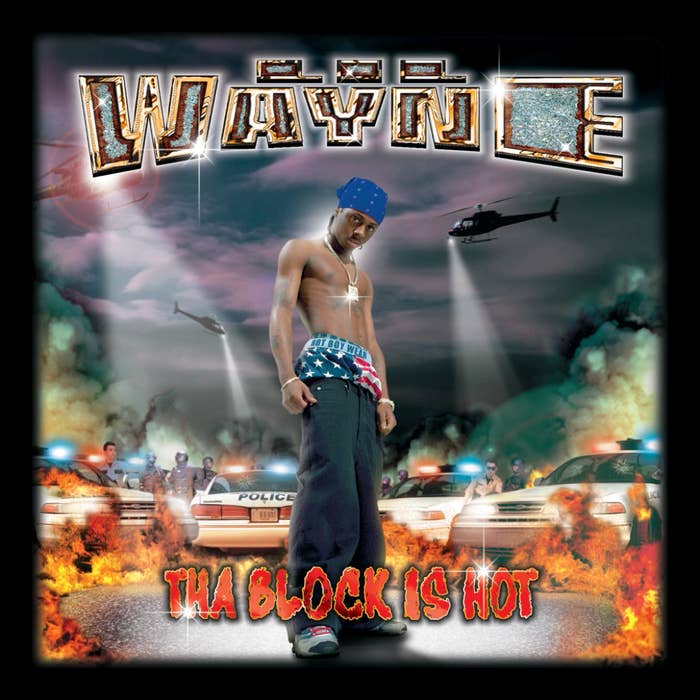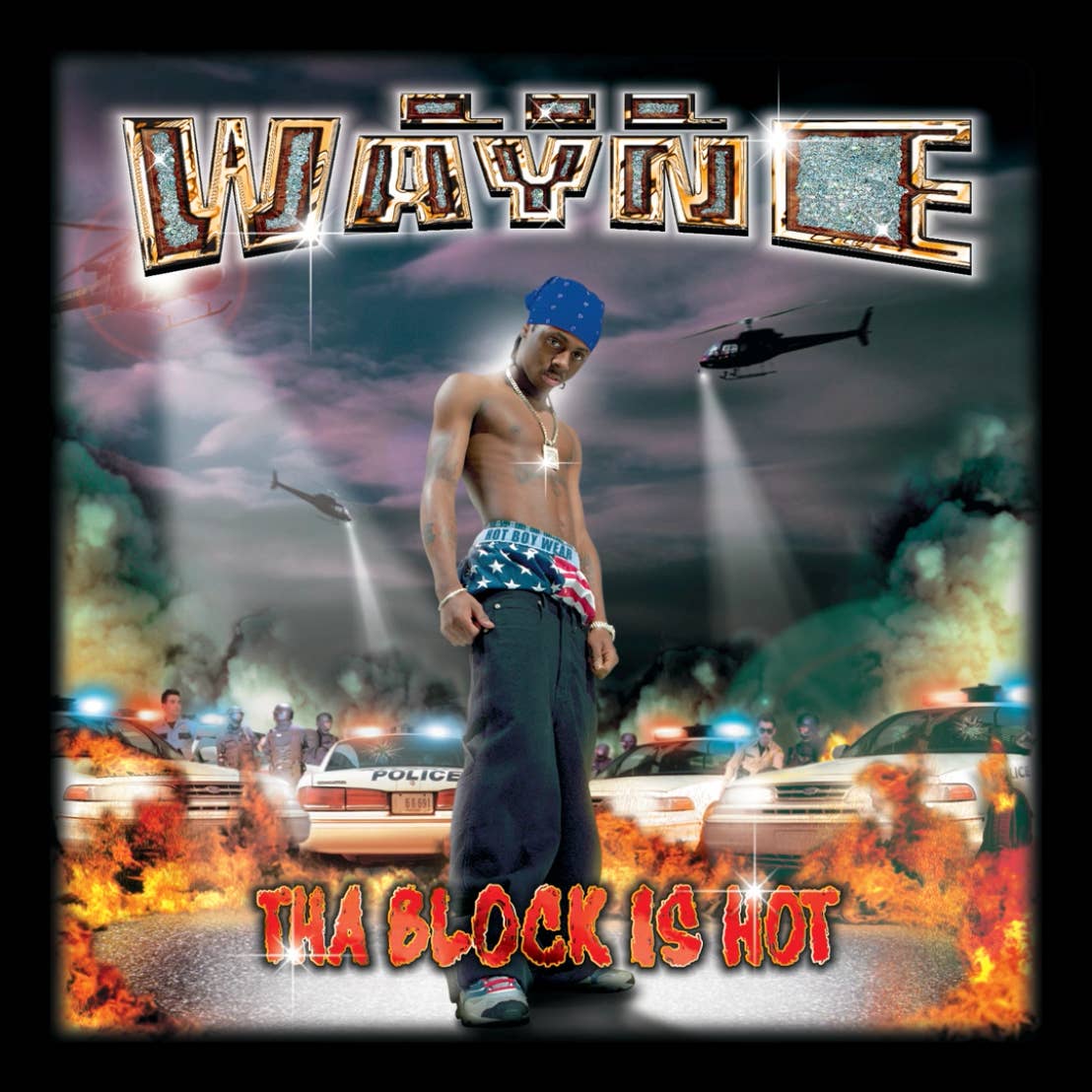
By November 1999, Cash Money Records had reached new heights. They were coming off three major releases (Juvenile’s 400 Degreez, B.G.’s Chopper City in the Ghetto, Hot Boys’ Guerrilla Warfare) and secured a distribution deal with Universal Music so lucrative it shifted the southern rap landscape. As such, it was an optimal time to take a calculated risk on a teenage rapper who was far from a sure thing, but who possessed a distinct perspective and a sing-song flow that could be youthful and nasally in one verse, raspy and world-weary in the next.
The story of how Lil Wayne ended up signed to Cash Money (and in the care of Bryan “Birdman” Williams) is well-trod territory. But Tha Block Is Hot, Wayne’s debut solo studio album, is often omitted from the superstar’s career narrative. As a body of work, it pales in comparison to the first three entries in the Carter series, or his iconic late 2000s mixtape run, but it certainly has its share of standout moments. Most enduring among them are the ways Tha Block showcases many of Wayne’s musical predilections that would come to the fore during his time as the world’s biggest rapper.
By the turn of the millenium, Wayne had been served to us in small doses—a solo song on a Hot Boys record here, a pointed verse on a Big Tymers or B.G. song there—and it was a major leap for him to be unveiling a 70-minute solo record. Yet, the ever-precocious MC knew that he had eyes on him, which gave him the opportunity to make a meaningful opening statement.
“Back in the day, people didn't really listen to music from the South,” Wayne said in a 2000 Washington Post article that condescendingly called him “Cash Money’s littlest rapper.” Wayne added, “It wasn’t no popular part of music. But they listening to us now. And we showing ’em how we been doing it all along.”
Wayne’s first full turn in the solo spotlight had its share of standard issue rap braggadocio, but it was given new life thanks to Wayne’s colorful, exuberant delivery. Those moments of extravagance were balanced with vivid snapshots of his life in New Orleans’ Hollygrove neighborhood that were grim, urgent, and, at times, heartbreaking. He recounts nervous nights selling drugs on street corners and the death of his beloved stepfather with the frustration of a teenager trying to make sense of a harsh and illogical environment. “Give me a cigarette, my nerves bad/The Feds said they heard that I know where them birds at,” he raps anxiously on “Fuck tha World.”
That track is one of the clear highs on Tha Block, as Wayne expresses his anguish and resentment over dealing with more pain in his childhood than most people experience in entire lifetimes. “And my lil' girl whole family tryna lie in court/Tryna' put me, a child, on child support/And whole family deny me of what I do cause I'm a 'thug and stuff'/Plus, my niggas keep fallin to them drugs and stuff,” he raps without a trace of vanity. Wayne has played up his youth throughout his career, but it may never be deployed more effectively than here, where it highlights the absurdity of a family law dispute between teenagers.
“Fuck tha World” highlights how Wayne’s gifts were clearly beyond his years at the time. As The Ringer’s Micah Peters put it, “Wayne raps like a kid that can suddenly lift 10 times his body weight.” That’s also true on cuts like the title track, “Up to Me,” and “Enemy Turf,” but it’s most evident on “Fuck tha World.” The song’s confessional nature has been mirrored in some of Wayne’s most candid and poignant music over the decades, from mixtape cuts like the scathing Hurricane Katrina-inspired “Georgia...Bush” to his verse on Solange’s “Mad” all the way to Carter V’s “Open Letter.” For as gifted as Wayne is as a technician, his knack for balancing style and substance has always elevated him above other artists with similar commercial success.
Wayne’s lyricism is also front-and-center on the stirring “Up to Me,” where he speaks to his late stepfather, Reginald “Rabbit” McDonald. “I know I'm young, but when you left dawg, thangs got wild/I know you probably sayin’ 'Damn, you raisin’ children now?'/But it's all gravy I'm with Baby makin millions now / So I still smile,” he raps.
Elsewhere on Tha Block, Wayne showcases his penchant for quippy, droll humor, which would later animate tracks like “6 Foot 7 Foot” and “A Milli.” On Tha Block’s “Respect Us,” he raps, “Ride on your block, I see a dozen weak jerks/Now it's time for your momma to order a dozen t-shirts.” Like Wayne’s best jokes, the lines don’t undermine the point that he’s trying to make; they illustrate the nonchalance in which he could dispatch you and all your friends if he saw fit.
Tha Block Is Hot features early examples of Wayne indulging his musical eccentricities. Reggae has long been a fascination of his, and while he never explored it as fully as he did with power chord pop rock on Rebirth, he occasionally dabbled in the genre throughout his career. Tha Block’s “Not Like Me” features a reggae hook from Trinidad & Tobago-born vocalist and one-time Cash Money member Papa Reu. As his star rose, Wayne went on to work with more celebrated Caribbean acts like Sizzla (“The Only Reason”) and Junior Reid (“Pom Pom”). Weezy even tried his own hand at Jamaican patois on solo songs like “Rude Boy” and his freestyle over JAY-Z’s “Lucifer,” which itself sampled reggae pioneer Max Romeo.
There are also moments on the record that show an artist who was very much figuring out his strengths and weaknesses. The task that became one of Wayne’s signatures during his immaculate feature run in the mid-2000s—providing a lean, crystallized thesis on the hook—often falls to B.G. and Juvenile. On “Remember Me,” B.G. mythologizes Wayne, rapping “Lil’ Weezy Wee... had ta steal, hustle, and jack/Weezy Wee roll with K's, Glocks, and MAC's The little G, he was raised keepin' it real,” while Juvenile handles the mission statement of the larger-than-life “Loud Pipes.”
At the time, Wayne’s biggest commercial moment had come on the post-chorus of Juve’s “Back That Azz Up,” and there are records clearly picked by Cash Money’s A&Rs (or, more likely, Birdman) that aim for that same success, to mixed returns. “Drop It Like It’s Hot” is far too on the nose, literally cribbing his famous line and using cheap strings that sound more like a discount Mannie Fresh imitation than something made by the legendary producer himself. “Watcha Wanna Do” benefits from a creative cadence on the hook, but its verses feature boilerplate tough talk that Wayne greatly improved upon with later cuts like “Hit Em Up” or “Shorty Bounce.”
Just as he did on the intro of “Back That Azz Up” when he foretold Cash Money’s rise to the top of rap, Juvenile proved himself nearly clairvoyant again on the outro of “Respect Us,” as he points out, “In the year 2000, it’s all about Wayne/It’s your throne, man, run that thang.” He may have been a few years early, but Juve was dead-on that Wayne would be a force throughout the new millennium. And many of the skills that would eventually take him to the top of rap were previewed early on Tha Block Is Hot.



